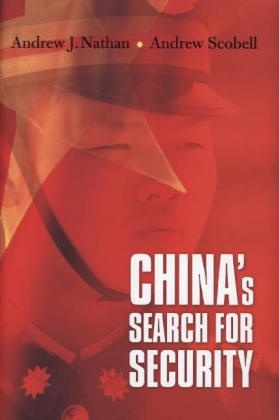Read more
Informationen zum Autor Andrew J. Nathan is Class of 1919 Professor of Political Science at Columbia University. His books include Chinese Democracy ; The Great Wall and the Empty Fortress ; The Tiananmen Papers ; China's New Rulers: The Secret Files ; and How East Asians View Democracy . Andrew Scobell is senior political scientist at the RAND Corporation. He is the author of China's Use of Military Force: Beyond the Great Wall and the Long March and the editor of more than a dozen books on the Chinese military and Asian security. Klappentext Despite its impressive size and population, economic vitality, and drive to upgrade its military capabilities, China remains a vulnerable nation surrounded by powerful rivals and potential foes. The key to understanding China¿s foreign policy is to grasp these geostrategic challenges, which persist even as the country comes to dominate its neighbors. Andrew J. Nathan and Andrew Scobell analyze China¿s security concerns on four fronts: at home, with its immediate neighbors, in surrounding regional systems, and in the world beyond Asia. By illuminating the issues driving Chinese policy, they offer new perspective on China¿s rise and a strategy for balancing Chinese and American interests in Asia. Though rooted in the present, Nathan and Scobell¿s study makes ample use of the past, reaching back into history to contextualize the people and institutions shaping Chinese strategy. Inhaltsverzeichnis Abbreviations Introduction Part I. Interest and Identity in Chinese Foreign Policy 1. What Drives Chinese Foreign Policy? 2. Who Runs Chinese Foreign Policy? Part II. Security Challenges and Strategies 3. Life on the Hinge: China's Russia Policy During the Cold War and After 4. Deciphering the U.S. Threat 5. The Northeast Asia Regional System: Japan and the Two Koreas 6. China's Other Neighbors: The Asia-Pacific 7. China in the Fourth Ring Part III. Holding Together: Territorial Integrity and Foreign Policy 8. Problems of Stateness: Tibet, Xinjiang, Hong Kong, and Taiwan 9. Taiwan's Democratic Transition and China's Response Part IV. Instruments of Power 10. Dilemmas of Opening: Power and Vulnerability in the Global Economy 11. Military Modernization: From People's War to Power Projection 12. Soft Power and Human Rights in Chinese Foreign Policy Part V. Conclusion 13. Threat or Equilibrium? Notes Acknowledgments Index...

